#created by formerly incarcerated people
Text

a new world is growing. As our roots pierce the concrete - our imaginations blossom new realities the violence-based world can see.
Abolition is Creative Hoodie by For Everyone Collective - fashion free from harm.
#prison abolition#abolitionist fashion#created by formerly incarcerated people#streetwear#ethical fashion#slow fashion#living wages#abolition is creative#police abolition#healthcare for all#housing for all#a new world is growing#for everyone
21 notes
·
View notes
Text
BREAKING: In response to the GOP's anti-voter ACE Act, Democrats are re-introducing the Freedom to Vote Act, which actually helps people vote.

What is the Freedom to Vote Act?
The Freedom to Vote Act is a revised voting rights bill based on the main pillars of the For the People Act.
Protecting the right to vote, ending partisan gerrymandering, and tackling dark money in politics.
It is the most important voting rights bill since the Civil Rights era.
The Freedom to Vote Act tackles corruption by ensuring that our government works for us.
Combats dark money loopholes that allow billionaires to buy our elections
Prevents foreign interference in U.S. campaigns
Strengthens campaign finance enforcement
Creates an innovative small donor financing option for House elections
The Freedom to Vote Act creates national standards for voting, ensuring all 50 states have...
Automatic voter registration
Same-day voter registration
Online voter registration
Early Voting Guaranteed two weeks incl. nights and weekends
The Freedom to Vote Act will protect our right to vote.
Expands no-excuse vote by mail for all eligible voters
Gets rid of long lines at the polls (and end unjust bans on food + water being distributed!)
Curbs discriminatory voter purges
Restores voting rights to people formerly incarcerated
The Freedom to Vote Act is essential for fair districting and will ban partisan gerrymandering.
Prevents subversion of the electoral process.
Protects election officials and poll workers
Combats mishandling of ballots and other sensitive materials
Republican States have passed almost 100 laws rolling back voting rights in the 10 years since the Supreme Court gutted the Voting Rights Act in Shelby County v. Holder.
In Georgia, the gap between Black voter turnout and white turnout in the 2022 election was the highest it had been since 2014. And in Alabama, the gap between turnout has *tripled* since SCOTUS removed the protections of the Voting Rights Act in 2013.
Together with the John Lewis Voting Rights Advancement Act, these are the bills that we need to see signed into law now.
Our democracy can’t wait.
58 notes
·
View notes
Photo







[image ID: a banner that reads “pride icons for charity” with a rainbow decal and squiggly line designs, followed by six portrait icons of various characters on pride flag backgrounds. end ID]

[image ID: a banner with a rainbow decal. end ID]
happy pride month! this june I’ll be doing icon commissions for pay-what-you-can through ko-fi, with all profits donated to Rainbow Railroad!
Rainbow Railroad is a global not-for-profit organization that helps LGBTQI+ people facing persecution based on their sexual orientation, gender identity and sex characteristics escape systemic and state-sponsored violence and find safety through emergency relocation and other forms of assistance. [more information available on their website, linked here].
icon commission details:
icons will be stylized single character busts with solid and/or pride flag backgrounds, and can be of real people, characters, or OCs (ask about props and accessories! / as with any other commission, I may turn certain requests. see my commissions page for further details [link])
$5-15 is recommended (but don’t feel pressured to donate more than you’re able, less or more than that range is okay!)
payment is received through ko-fi will be pooled and donated to Rainbow Railroad at the end of the month via canadahelps.org [linked here], and I am happy to provide donation breakdowns and receipts to those who request them!
I will also do icons for anyone who prefers to donate directly to Rainbow Railroad if you’re willing to share the donation receipt!
dm if interested (you can forego my commission request form for these icon commissions!)
I encourage checking out Rainbow Railroad and donating if you can regardless of my commissions, and if you live in/are celebrating pride month in canada and/or are able to, consider also supporting the following Indigenous non-profits:
2-Spirited People of the 1st Nations - “a non-profit dedicated to creating a place where Two Spirited people and Aborignal people living with HIV/AIDS can grow and learn together as a community, fostering a positive self-sufficient image, honouring our past and buidling a future.” [website link]
Thunder Woman Healing Lodge Society (TWHLS) - “an Indigenous-led charity based in Toronto dedicated to supporting formerly incarcerated Indigenous women,” currently working to create “Ontario’s first Indigenous owned and led healing lodge for Indigenous 2SLGBTQIA+ women.” [website link]
NWIA (Native Women in the Arts) - “a not-for-profit organization for First Nations, Inuit and Métis women and other Indigenous gender marginalized folks who share the common interest of art, culture, community and the advancement of Indigenous peoples.” [website link]
reblogs & boosts greatly appreciated, stay safe & happy pride!

[image ID: a banner with a rainbow decal. end ID]
#pride#pride month#charity#commissions#icons#cartoons#art#digital art#gay#lesbian#bi#bisexual#trans#nonbinary#art commissions#ocs#(tagging the included characters:)#blinkie#blink#frankie stein#moomin#moomintroll#tiernan#yorvick#yorvick petrov#princess bubblegum#fan art
502 notes
·
View notes
Text
I've seen a few posts here and there saying that Cisco never should have turned down Breacher's job offer in season 4, and some saying that taking that job would be a better outcome for him than working for A.R.G.U.S., and I'm sorry, but I feel like anyone who thinks that has a fundamental misunderstanding of Cisco as a character.
The major difference between A.R.G.U.S. and the collectors' agency is that A.R.G.U.S. had a problem with corruption from the inside, whereas the collectors are bound by unjust laws. By taking Chip Cooper's job (and eventually working his way up to the head of A.R.G.U.S.), Cisco gains the power to be able to make the kind of calls that the people who formerly held his position(s) made the wrong decision on; A.R.G.U.S. has done some shady shit in the past, but it was the people in charge of A.R.G.U.S. who were responsible for it. Now with Cisco holding a position of power there, he's able to prevent any harmful or unethical practices by simply choosing to do the right thing.
As for the collectors, their job is to uphold the law of Earth-19 by hunting down and capturing people who traveled to other earths without authorization, and bringing them back to be executed.
Cisco would hate doing Breacher's job. He would literally hate it. He took direct action to stop one of Breacher's orders from being carried out, risking his own life for it, and he told Cynthia straight up that she should do more with her life and try using her powers to actually be a hero. It would make absolutely no sense for him to leave his job of saving people at S.T.A.R. Labs, to go and work for a government agency that kills people for trying to leave their home earth. And he couldn't infiltrate the agency and change it for the better from the inside, because then he'd just end up—at best—getting fired, because only changing the laws could fix what's wrong with the collectors. The only scenario where Cisco working for the collectors would make sense would be one where he's a rogue agent smuggling his targets to somewhere they'd be safe; figuring out a way to incarcerate the dangerous ones (going through the legal channels of whichever earth they've committed crimes in or maybe keeping them in the Pipeline or Lian Yu if he has no better option), and relocating the non-dangerous ones in a way that prevents the other collectors from finding them, maybe creating fake identities for them. I mean...he'd have to become Echo.
#I had a point#but now Echo with a steel chair has made me lose track of it#because damn THAT'S an idea#anyways Cisco could never be a collector#I've never understood why anyone would want that for him#Cisco is not a tiger shark (iykyk)#The Flash#Cisco Ramon
19 notes
·
View notes
Note
Do you have any suggestions on anti-psych books to read? I've read a little about it before, but mostly on the science/medicine side of things (like how some pharmaceutical companies pay psychiatrists to produce studies promoting their medicine, how diagnostic criteria can create problems in other cultures, stuff like that).
It sorta depends on what you mean by books? Literature, for sure, absolutely. But like. Mostly journals, zines, self-published narratives from those detained in various psychiatric institutions over the years, or even the odd clinical paper.
Personally, a lot of what I read that brought me to anti-psych had nothing (or very little) to do with psychiatric medicine in the first place. It was more about the role of autonomy and embodied trauma in self-concept and communal identity over time, the relationships between incarceration and institutionalization, prison abolition literature at large (which is often much more explicitly anti-psych than people realize when they choose not to read actual prison abolition literature and theory, especially Angela Davis' work), and anthropological research on personal and communal identity, as well as resource collection and distribution across different cultures and associated markers of quality of life. I realize that looking at all those different systems and smashing them together in your brain like rocks in a polishing tumbler isn't the most sexy method of radical learning available, but it has wprked pretty well for me in generating complex understandings of the systems at work in anti-psych conversations nonetheless.
Anyway, if you want some of the go-tos I often refer people towards, I'll send you to authors rather than specific works.
Angela Davis has phenomenal insight into the experiences of intersecting incarceration amd pathologization, allowing for some truly nuanced discussion of how mental health care is wielded as a weapon instead of a resource.
The Jane Addams Collective is a group of anarchist social workers and mental health practitioners who work to share their knowledge of praxis, trauma, recovery, and mutual aid to establish community care models that can be utilized even without professional supervision.
Michel Foucault's writing on identity, community, and surveillance are honestly essential to anyone who wants to internalize a comprehensive understanding of how these things impact each other through various systems and dynamics
Judith Butler is a bit of a classic and frankly I hate how she writes stylistically, but she does great work on embodiment and identity, both personal and societal/communal.
I also really like Julia Oparah's (formerly Sudbury) work on abolitionism and experiences of incarceration
The Mad Liberation Front is pretty well known within antipsych circles I think for putting out literature on various topics within the framework
You can also search the anarchist library for their dissertations, books, and other texts on anti-psych here:
https://theanarchistlibrary.org/search?bare=1&bare=1&page=1&query=anti+psych
Anyway, I realize it's maybe not the kind of reading list you were expecting when you reached out but I hope it helps anyway!
4 notes
·
View notes
Text
BY QUIANYA ENGE
This month, thousands of Carbondale residents took to the polls to determine the way forward for our city — myself included. Civic engagement has long been incredibly important to me. I live to serve my community, with the belief that the people closest to the problem are closest to the solution, but furthest from the resources and power to advance change.
While I cast my vote with pride, I was also reminded that in spite of my service and commitment to my community, my name could never appear on that ballot, simply because of my past. In Illinois, people with criminal records are prohibited from running for local office, representing the community at their school district or local library and serving on a number of boards and commissions throughout the state.
I serve on the Carbondale United executive board, am an Illinois state-certified community health worker, chair the NAACP Carbondale branch’s criminal justice committee, am on the board development committee of the neighborhood co-op and am a doctoral candidate and former instructor mentoring young minds on and off campus. But because of a past conviction, the law prevents me from local civic leadership and community service.
Across the state, 1.2 million adults have conviction records. That is over one million Illinoisans who have served their time, paid all fines and fees related to their conviction, and are permanently barred from serving their communities. Further, we know that because of the racism that undergirds our economic, political and social systems, Black and Brown communities are disproportionately impacted by the legal system, and are therefore being shut out from these positions at higher rates. 35% of the 1.2 million adults with records are Black, two and a half times higher than the state’s Black population.
These barriers are an affront to voting rights, and at the end of the day, they are detrimental to communities themselves. Civic engagement lowers recidivism rates. When people are civically engaged, they become more invested in the long-term health, safety and stability of their community. Ensuring successful reentry for formerly incarcerated people means ensuring they are resourced with the tools to thrive independently and contribute to the community.
Our Constitution is clear that punishments and penalties for crimes should neither be cruel nor excessive. And yet, millions of people across the state — people who pay taxes, who vote, who contribute to their communities — are denied the full opportunity to improve their neighborhoods long after they’ve completed their sentence. An entire population is being denied full citizenship — and few even notice.
Directly impacted people across the state, including here in Carbondale, are pushing for commonsense legislation that would eliminate these lifelong barriers and ensure all citizens are treated with dignity and have the opportunity to serve their communities. Right now, the Illinois State Legislature is considering House Bill 2824/Senate Bill 2347, The Promoting Involvement & Empowerment Through Civic Engagement (PIECE) Act, which would allow people with felony convictions to hold local elected office and serve on key state boards and commissions. The legislation would also create common sense limits for those who have violated the election code or committed official misconduct, and it will require someone seeking appointment to a board or commission to disclose a conviction related to that board or commission’s work.
On Election Night, one of my dear partners in this work suggested I put my name in the running for a future race. Women — especially Black women — are shut out from elected office for so many reasons, and it was heartbreaking to have to tell her that I couldn’t, in spite of my motivation and ability to serve the community. Even though this issue impacts so many across the state, few people have any idea that these archaic laws still exist.
Solutions to the most difficult issues plaguing our neighborhoods are going to be best developed by those who are closest to the pain. When we bar an entire population of people from contributing to these solutions, we’re not only denying them basic civil rights; we’re harming the larger community.
#us politics#news#op eds#heartland signal#Quianya Enge#Illinois#civic engagement#restore voting rights to felons#restorative justice#voting rights#2023#Illinois State Legislature#House Bill 2824#Senate Bill 2347#Promoting Involvement & Empowerment Through Civic Engagement Act#prison reform#criminal justice system#criminal justice reform
10 notes
·
View notes
Text


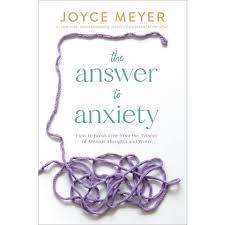



Again Happy New Year 🎊 to everyone all across the world and their family ❤️ thank you
Today
Proposing the letter of explanation concerning employment and housing for the formerly incarcerated act , this law is to be tact onto the fair chance act to compete for employment act passed by Me Allen Henry and former mayor Bill De Blasio of the year 2019 ,
🎆Happy new year my concern is to further expound on the subject of fair chances for all citizens of America and assimilate and integrating the formerly incarcerated into housing and employment to therefore stop the recidivism ratio of people returning to prison instead of them being a given a fair chance to obtain housing and employment in any occupation or types of buildings to live in without any discrimination . What I propose is that an letter of explanation being taken into full consideration to grant that candidate their housing and employment without any barriers to entry into their career of their choosing and their housing choice . It should be illegal to turn down a person with a proven track record of having served their debt to society through programs of rehabilitation with a list consisting of the forms of rehabilitation as proof to that person studying and learning to be fit , safe to be around , civilized and ready to go back to a normal life or for those curse by generational poverty and underdevelopment of character that made those wrong choices by not being educated at the moment about their choices and what it may cause in their life by not being conscious or fully made aware of what their actions may cause on the future chances in employment and residential areas choice of living , if we don't really take their letters of explanation in and their proof of rehabilitation then we are creating condemned career criminals or permanent situation where that person can only achieve so much and not what this country and its democracy promises that person .
A letter of explanation should consist of :
Programs that deal with issues of
GED or high school diplomas for adults and contuining adult education program
Hard skills technology course skills needed to do the job and that's occupations technical skills
Vocational rehabilitation Access Vocational rehabilitation programs process and certificate
Anger management groups and sessions
Drug abuse
Cognitive distortions , cognitive behavior therapy a program that changes their perspective on current actions , behaviors and thoughts that led their in that situation CBT has proven to help create that change and for people that went through that process a much much better life
All mental health issues then the dual disorder effects
And all other irrational thinking erroneous way of behaving and cognitive distortions that person has to be given a chance to express that change and be granted employment and their housing so that people can get it together give them that chance and fully appreciate and take in the letter of explanation for heavy consideration for employment , loans , mortgages and then their housing in residential buildings without discrimination as if no proof of rehabilitation has been given through process and certification .
Please consider them without any discrimination .
" To the promise land the book helps us to remember King 👑 as a prophet for poor and working class people , as we carry on that campaign against racism and poverty in our own times . A terrific book , - Timothy B . Tyson
Author of the blood of Emmit Till
Northern Ghettoes are the prisons of men
I have the audacity to believe that peoples everywhere can have three meals a day for their bodies , education for their minds , and dignity , equality , and freedom for their spirits .
King Nobel Peace prize speech 👑
Oslo , Norway , December 10 , 1964
Labor and civil rights at the crossroads , 1964 - 1966 .
There are three major social evils that are alive in our world today .... The evil of war , the evil of economic injustice , and the evil of racial injustice .
Let us continue to hope , work , and pray that in the future we will love to see a warless world , a better distribution of wealth , and a brotherhood that transcends race or color . This is the gospel that I will preach to the world .
Let us develop a kind of dangerous unselfishness ... I may not get there with you . But I want you to know that we as a people will get to the promised land !
King in Memphis , April 3 , 1968
Happy New York to everybody from every communities across the world I wish you and your family a Happy New years and enjoy your parties and yes I will be right by your side in spirits partying with you so you don't miss me I'm there with you , remember to get a designated driver if you get too Intoxicated to drive after your party 🎉 remember lotta of accidents occur because of someone was irresponsible and try to get behind the wheel too drunk to drive so get a driver buckle up and watch for innocent pedestrians crossing the streets please be careful people kids are out there so drive slowly and cautiously please and enjoy your party and holiday and light a blunt for me laughter that's hot , thank you and happy holidays everybody I'm there with you at the party so let's party 🎉 thank you you won't miss me I'm there with you .
Shout out to Nas the rapper he taught me to just be about business the business my own business and enjoy people get along and life is very good that is his plans for my evolution and growth from how we was when we was younger all of us from our old old neighborhoods in the streets the hood thank you so much for letting me help the people with this page thank you so much .
Happy New Year's I wish you a blessed life , good health , fun , being content and then prosperity where you may be at in this world and salvation for humankind in the not so developed communities , towns and countries of the world and that God and his good people come to your rescue all kinds of people the good people , thank you so much .







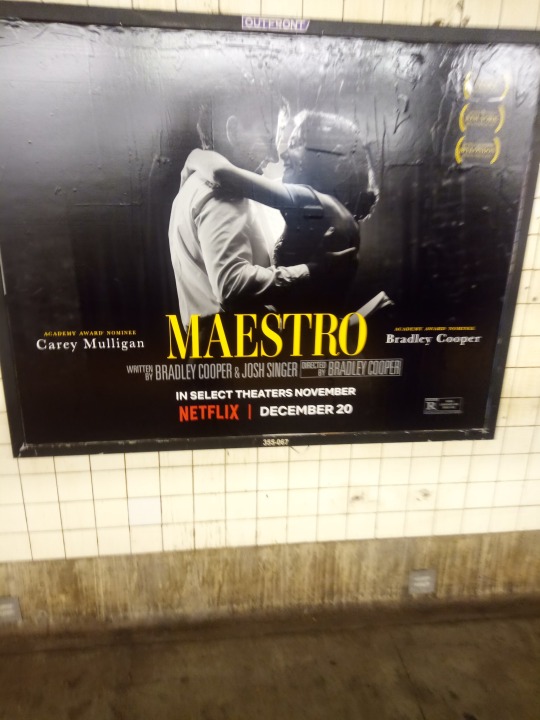

God still has plan for my life and yours no matter what circumstances you may be living in I'm blessed . Governor Kathy Hochul called in the National Guard to get the people in the public off of me , NYPD , MTA workers , NYCD New York City Correction Department, Parole and Probation to get off of me I got no case with them I went legit it's been people in the streets with police and white people trying to drive me crazy the whole New York City using voodoo and I brought Joel Osteen and Joyce Meyer to this city to civilized the people read all their books on any issue you got like Anxiety which causes 99 percent of crimes daily , worrying , depression and not having hope is the major cause of stress , helplessness , hopelessness because the system in place the way the world is but if you read their books it will change your life and I know for a fact musicians in Hip Hop was using voodoo and working with police using voodoo and police against me thank goodness for my people my blood giving me that second stage I wonder does that help them sell records keeping their foot on my neck and or are they jealous because black royalty got me now the black royal family is with me now and better them no then people hate and they work with police and try to unite against me start a new world order against the man helping his community I just legalized weed in like 9 more states come to New York we got weed stores like it's Amsterdam I did that for you please take the voodoo off of me so I could go live my life and enjoy my life in peace ✌️ and quiet . God wins that battle Christianity is based on forgiveness to a Muslim it's all the same true it's the same difference Islam and Christianity I'm a king so I'm familiar with all of it really and realistically I'm 5 Percenter of Nation of Gods and Earths and no I don't mess with other members no more I don't trust nobody in it I let the elders and the brothers in the suits Nuri Muhammad and Farrakhan teach and help them and Islam and Christianity is my only weapon though it's my only gun Gods word and it should be yours your only gun instead of killing your people or neighbor Gods word can be your weapon your knife your automatic weapon it should be gods grace and love for your life in love and compassion for yourself and other human beings we not perfect but God is perfect learn how to deal with situations like that coping skills I love God's word about me and life and my pastors and ministers do come first in my life now but I'm a musician and a businessman and I have a getting money background from the streets but I moved on from the part of my life in the streets and became bigger than I was and I'm grateful and content with being me I love me and what I'm about and this page and my list of accomplishments and my city is a reflection of me I'm everywhere and I help because I know my people needed the help and I was happy to help like I'm that legalized weed that is amazing to me it hits me that I did that I'm the guy that legalized weed I got everything back they gave me my life back I just gotta do my due diligence and get myself together we aight I moved on from the street culture I mainly just help out here to make it better for a people that been treated badly for generations of them I hope the best for them but I'm by myself now and I stay to myself and no to the media and any attachments to me get your life together and move on from me I said no to you attaching yourselves to me no thank you . Look we civilized the famous jail , Rikers Island with my computer programs on Rikers we gave the inmates tablets and video games in jail in New York City and legalized weed and gave them their freedom from old drug cases before my law passed on March 31st , 2021 we reached back and gave them their freedom and civilized them with computers now try Joyce Meyer and Joel Osteen they will civilize New York City I read their books all the time even with a busy schedule on the issues I'm dealing with at that time and so should you now it works for me .
2 notes
·
View notes
Text
The problem, I thought, wasn’t with hearts or minds. It was the rules that kept a woman with children from being able to rent an apartment because she has a criminal record. It’s the policies that push a landlord to evict a grandmother because her formerly incarcerated grandson slept on her couch. Imprisonment and being viewed as a criminal by the larger society create material conditions that must be dismantled if we’re serious about making change. The problem is policy, not people’s hearts. It is actions—at least, that’s what I believe. Ronald would follow that statement with a sentiment that challenged my presumptions.
“If you don’t change hearts and minds,” he’d say, “with the stroke of a pen, when someone new comes into power, they can wipe away all your progress.” This is true. History isn’t linear. Time passes from year to year, but we don’t move from one victory to another until we get closer to some version of the truth or some great new world where our problems have all disappeared. We don’t perfect the union, not in the ways we typically talk about. To borrow words from Angela Davis, freedom is a constant struggle. In this case, the struggle is about making a world in which everyone belongs, even the people you’re afraid of. The problem of mass incarceration is really a problem of citizenship. This is because citizenship isn’t just about whether or not someone has a set of legal rights. Citizenship is something each of us practices in everyday life. It is made through everyday exchanges and between people at every level, because citizenship is about belonging
Reuben Jonathan Miller, Halfway Home: Race, Punishment, and the Afterlife of Mass Incarceration
13 notes
·
View notes
Text

Patrick Gibson joins the cast of the "CLYDE'S" at Donmar Warehouse Theatre in London. The play will run from 13th October to 2nd December 2023.
The play was written by Pulitzer Award winner, Lynn Nottage, and is being directed by Lynnette Linton. Patrick has already worked with both of them, playing Jason in the "SWEAT" at Donmar in 2018, and later on at West End's Guielgud Theatre in 2019.
"CLYDE'S" is a comedy set in a truck stop sandwich shop somewhere in Reading, Pennsylvania, and revolves around a group of formerly incarcerated kitchen staff trying their shot at redemption - and their shared quest to create the perfect sandwich, giving them purpose and permission to dream.
The characters are: Clyde, callous owner of the shop, keeping her staff under her thumb and not allowing them to get "too high on hope"; and the cooks who all served time in prison and hope to redeem themselves and escape their past: Leititia stole medicine and oxy from pharmacy, Rafael tried to rob a bank to buy his girlfriend Cavalier King Charles spaniel, Montrellous avoids sharing his story, focusing on the perfect sandwich. They are joined by Jason, recently out of prison and covered in white supremacist tattoos (yep, it's the Jason from SWEAT).
It's a poignant story about worker solidarity and the meaning of second chances, loaded with laugh-out-loud funny jokes.
from the script:
"JASON: I hate that every time I look in the mirror I see all my shit on my face. But, when I'm here I kinda forget, don't think about it.
JASON: I had this whole fantasy of what life was gonna be like when I got out, thought it would be easier to leave all the bad shit behind, start where I left off … you wouldn't know it, but I had a good life going before I got incarcerated. I had an apartment in the heights, for real, a 401k, then shit went south.
JASON: I lost my job, got locked outta my factory by some greedy corporate assholes, and it felt like the world was over. Kept looking for people to blame. Anybody, everybody, fuck 'em all. And then when these … scabs started crossing the picket line like it was nothing, all I could think was, you can't have my vacation on Hilton Head, my Harley, my ice-cold beer after work, you can't fucking have it. And … I wanted to destroy 'em. I got drunk, like real drunk, found a bat in my hand and picked this one guy to release on.
A moment. Jason speaks as if talking to the victim.
I know I was wrong. I'm sorry. I'm so fucking stupid and sorry, and I hate thinking about it, cuz it hurts all of the time. I'm sorry. I'm so sorry. "
5 notes
·
View notes
Text
ByAnna Slatz
July 19, 2023
The Oregon Department of Corrections was recently ordered by a Marion County Circuit Court to immediately provide “gender affirming” care to a transgender inmate in their custody. While the single initial report on the case only referred to the inmate by his “chosen” name, Reduxx has learned that Nova June Gaia, 38, was imprisoned for sexually abusing a young girl.
Formerly known as Joseph Daniel Neilson, Gaia was first arrested in 2018 at a property in Portland, Oregon after being reported for sexually assaulting a child he was babysitting. The exact nature of the relationship between Gaia and the victim is being withheld by Reduxx for the purposes of protecting the child’s identity and dignity.
On September 3, 2018, Gaia was watching over two children, a girl and a boy, at a home in Clackamas County. According to the police report obtained by Reduxx, while taking the girl to the bathroom, Gaia licked the girl’s genitals. Later on that same day, Gaia fondled the girl’s vagina.
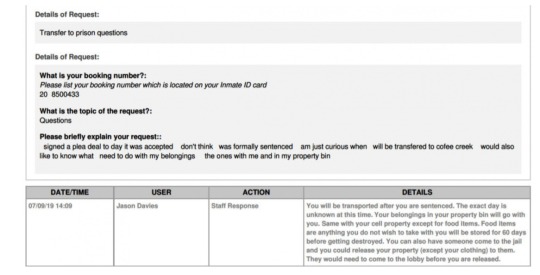
Gaia would ultimately be convicted on 6 counts related to the sexual abuse of the girl, and was convicted on one count of felony Sodomy and one count of Sexual Abuse in the First Degree. He was sentenced to 24 years in prison, and, according to the Oregon offender directory, his earliest possible release date is in 2043.
Reduxx obtained a 555-page inmate record associated with Gaia’s incarceration history which showed that the first and only time he mentioned his gender identity to prison officials was in October of 2019. Gaia filed an inmate grievance against a Deputy alleging he had “exposed to the entire [prison] block” the style of feminine underwear Gaia had been wearing.
“The Deputy loudly informed the entire block that, first, someone was wearing female underwear then, second, that I was the one who had requested them. This very much endangered me and created bias,” Gaia claimed in his grievance.

The grievance was found to be “unsustained” and closed without further action.
While in Clackamas County custody, Gaia was prolific in filing inmate grievances. Of the 555-page inmate record obtained by Reduxx, 431 pages contain requests and complaints from Gaia regarding staff, facilities, resources, or conditions.
Dozens of the complaints relate to demands for medication or treatment for ingrown toenails, back pain, dandruff, and hemorrhoids. In one, Gaia requested approval to buy a Dungeons and Dragons book from Amazon.
Shortly after being remanded to custody following his arrest, Gaia converted to Judaism and began submitting meal requests for pork-free meals. But months later, he advised the institution of his intention to become a Vajrayana Buddhist monk and requested the ability to ordain while incarcerated.
In one grievance from November of 2019, Gaia complained of “insects in the broccoli,” asserting it was a “violation of his religion and sensibilities.” At the time, Gaia threatened legal action for the supposed infraction, calling it a “sanitation, nutrition, and religious grievance.”
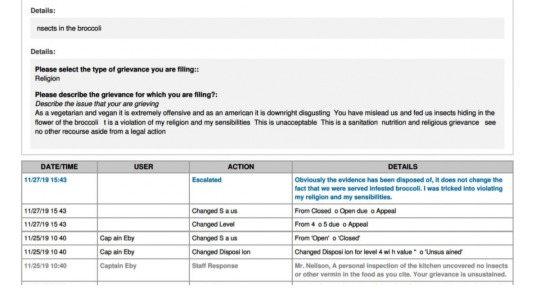
In 2021, Gaia changed his name and legal gender marker. According to the Oregon Department of Corrections offender directory, Gaia appears to have first changed his name to Nova June Neilson, and then to Nova June Gaia, which is now listed as his “court/legal” name.
The following year, he submitted a writ of habeas corpus, which was in part alleging that he had been denied “gender affirming care” while in state custody.
In May of 2023, a Marion County Circuit Court judge ordered the Oregon Department of Corrections to abide by Gaia’s demands.
Senior Judge Cheryl Pellegrini found the state violated a clause of the Oregon Constitution that prohibited officials from treating people in custody with what she deemed “unnecessary rigor.”
The Department of Corrections must now arrange for a variety of tax-payer subsidized treatments for Gaia, including facial feminization surgery, tracheal shaving, breast augmentation, and electrolysis, and transfer Gaia if the procedures can’t be carried out in his current county of incarceration.


While Gaia is currently incarcerated at Snake River – a male facility – that may change following Pellegrini’s ruling.
While it is unclear exactly how many male sex offenders in the US have begun identifying as transgender and receiving state-funded surgical procedures, authorities face the risk of possible litigation should they fail to comply with policies that frame the concept of gender identity as a human right.
Last fall, in the state of Idaho, a violent offender who sexually abused a 15 year-old boy was awarded more than $2.5 million in legal fees after suing the state for withholding “gender affirming care” while he was incarcerated.
Adree Edmo, formerly known as Mason Edmo, who was housed in a male prison at the time, also demanded a transfer to a women’s facility.
#USA#oregon#Another TIM who committed child abuse#Nova June Gaia#Gaia is a goddess of the Earth#Another TIM choosing a goddess name#Joseph Daniel Neilson#Another TIM transitioning while doing time#He was filing grievances for other issues before becoming trans
3 notes
·
View notes
Text

"Adalet no impaling your brother, Magnus, stop teasing your sister on her wedding day!" - Eir
Biographical information
Full Name: Eir Dahl
Gender: Female
Sexuality: Lesbian
Status: Alive
Age: 58 (season 2)
Birth: 1957
Race: Mythonite
Nationality: Asgardian
Origin: Vanaheim, New Asgard
Residence:
Asgard, New Asgard
Vanaheim, New Asgard (formerly)
Profession(s): Queen of New Asgard
Family:
Runa Dahl (wife)
Magnus Dahl (son)
Tómus Dahl (son)
Heimdall Sadik-Halvorsen (brother-in-law)
Adalet (Anders) Sadik-Halvorsen (niece/nephew)
Henrik Dahl (father-in-law) (incarcerated)
Sylvi Dahl (mother-in-law) (deceased)
Affiliation(s): New Asgard Royal Council
Profile
Height: 5’6”
Age: 58 (season 2)
Weight: 150lbs
Eyes: brown
Blood: B-
Eir is a woman of average height with long, curly red hair the colour of fall leaves that is beginning to lighten with age, warm brown eyes, and fair skin adorned with freckles. She can normally be seen wearing a drape-style brown dress ending just above her ankles, dark green heels and a forest green cardigan. She also wears dangling star earrings and a circle-style tiara just like Runa wears but Eir's tiara has blue jewels that match her wife's eyes.
Powers and Abilities
Asgardian abilities:
Super-strength
Enhanced durability
Enhanced speed
Superhuman Stamina
Regenerative healing factor
Flight
All-Speak
Star Generation
Asgardians can create small orbs of light which they call "stars" that they send up into the sky at night
Magic
History
Eir grew up on Vanaheim surrounded by the woods and a large lake connected to the ocean. Her family was well known for the customer, hand-crafted furniture and houses they'd build all across New Asgard. Eir is no stranger to carpentry and if you give her a design, she can probably build it!
She met Runa by chance (Runa calls it destiny) and the two were wed a few years later. Eir never imagined herself becoming a princess and later a queen but no matter how lavish her lifestyle has become, she'll always treasure growing up in the woods of Vanaheim. In fact, she was the one who suggested Magnus and Tómus go to school with the local children of Asgard. She wanted her boys to connect with the people in a way that private tutoring would prevent.
Eir remembers the sleepless nights she had after each of her children were born. Especially Magnus and Adalet since no one had planned for having two babies at the same time! But despite the extended periods she’d go without sleep, she cherishes every second she got to spend with her babies.
When Magnus told her that he was going to be proposing to Aurora, Eir couldn't contain her excitement. Aurora had been a friend of Magnus and Adalet’s since elementary school, always either keeping the twins out of trouble or getting dragged along for the ride! She always secretly hoped her son would marry Aurora, and her wish will soon come true!
While she is going to miss them when Magnus and Aurora move to Earth permanently, she would never stop any of her children from pursuing their dreams. Besides, they can still visit each other and Magnus promises to message, video call, and send her pictures as often as he can so she can keep up to date with his life on Earth.
Events of Criminal Case
Season 2
Like any good mother, Eir helped get Adalet ready for her wedding to Fili. She also prevented Adalet from killing Magnus after he teased his twin too much. Eir wishes she could say it was the only time she's ever had to stop any of her children from threatening to maim or kill each other, but she would be lying if she did…
Story Information
First appeared: Tying the Knot
Trivia
She found out she was pregnant with Magnus when Heimdall told her he heard an extra heart beating inside her
Likewise, she learned she was pregnant with Tómus when Adalet asked her why she had two hearts inside her
All of her children adored playing with her hair when they were little, even Magnus despite them sharing the same shade of red hair
She is not only the second Queen of New Asgard but also the Queen of DIYs!
Loves recycling and repurposing items and giving them new life
She is forbidden from learning about Pinterest
Seriously, do NOT show her the app, she will successfully make every DIY project she can find
She taught Magnus to use axes as his primary weapon. Eir spent a lot of time when she was younger chopping wood and still does. Magnus always found it interesting to watch and decided that he wanted to learn how to use battle axes when he was old enough
They’ve even entered axe-throwing competitions together as a mother-son team, they have several awards they’ve won over the years
Disclaimer: Character design was created using Rinmarugames Mega Anime Avatar Creator! I have only made minor edits to the design! Background courtesy of CriminalArtist5.
Links to my stories:
The Case of the Criminal (Ao3/Wattpad)
Killer Bay (Ao3/Wattpad)
Where in the World are the Killers? (Ao3/Wattpad)
5 notes
·
View notes
Text


Bay Davis on the things we deserve
Food, Safety, Healing, Accountability, Housing, Healthcare, Education, Water - For Everyone
Abolition is our guiding path towards a world where we all can be free, safe, and fulfilled.
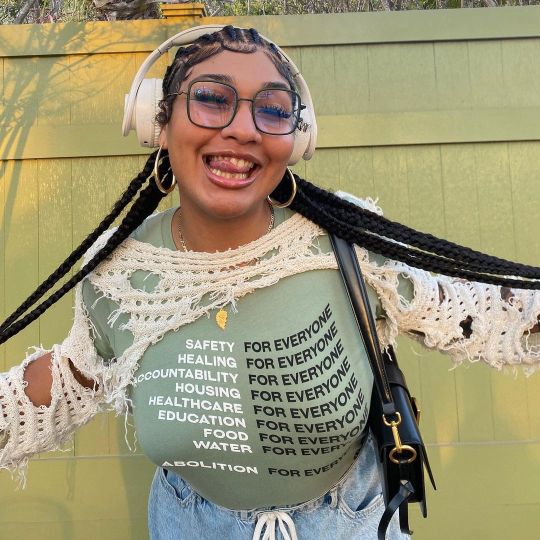
👕: www.ForEveryoneCollective.com
#a new world is growing#for everyone#abolition is creative#prison abolition#abolition is for everyone#the future is collective#created and printed by formerly incarcerated people#fashion rooted in care
3 notes
·
View notes
Text
youtube
‘How are we safer if 80 million people can’t get a job?’ — John Legend explains how expunging records not only helps formerly incarcerated individuals move forward but, in turn, creates a brighter future for whole communities
For more on the criminal justice system, subscribe to NowThis News.
#johnlegend #criminaljustice #reform #Politics #News #NowThis
#now this news#now this#solarpunk#John Legend#jobs#expunging records#prison#jail#incarcerated#criminal justice#reform#Youtube#USA
3 notes
·
View notes
Text
A Sparkling Gem All Can Enjoy: The Uniqueness of "City of Ghosts"

On March 5, City of Ghosts, an animated series created by Elizabeth Ito, formerly a supervising director of Adventure Time, premiered on Netflix. This series was positively received for its pacing, humor, voice cast, and animation style. Even though it has been over a month since it premiered, the show continues to be relevant, tackling topics which expose uncomfortable truths about our society.
Reprinted from The Geekiary, my History Hermann WordPress blog, and Wayback Machine. This was second article I wrote for The Geekiary. It was originally published on May 26, 2021.
Set in Los Angeles, City of Ghosts is about four kids who are part of the Ghost Club: Zelda, Thomas, Eva, and Peter. All four travel across the city, interviewing ghosts about their lives, adding the recordings to something called the "Ectopedia." Beginning in the first episode, the Ghost Club meets at a branch of the Los Angeles Public Library, sitting under a table, discussing how to find the ghosts.
Each episode focuses on a part of Los Angeles not often talked about, part of what Wired calls a "multicultural mélange." This includes Jo, a Filipina chef who owns a café in Boyle Heights, Sonya, the owner of a vegan café who teaches children poetry in the evenings, and Yulissa, a teacher at a music school who is trying to teacher her kids Oaxacan music. The show, which is for those age 5 and up, proposes a new way of thinking about history, ethnicity, and cities, while remaining educational in an engaging way.
The series tackles cultural appropriation, gentrification, discrimination, and historical erasure, while remaining what some call a "lovely…vision for children’s entertainment" and a "gentle love letter" to L.A. itself. For example, in the third and fourth episodes, the Ghost Club learns about Leimert Park and the Indigenous people of L.A., the Tongva. In the latter case, there is discussion of colonization, extraction, development, and language erasure by White settlers of areas where the Tongva lived. The Ghost Club then expands their map of the city to include all the Indigenous names, while Jasper (voiced by Honor Calderon) connects with the land and their heritage, learning to speak Tonga in the process. Other episodes focus on skateboard culture, the horrors of Japanese incarceration in World War II, a marionette puppet theater, and a whistling ghost who speaks in Zapotec.
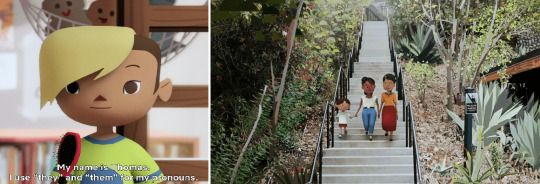
This "warm and huggable" series has subtle, but significant, LGBTQ representation. In the beginning of the second episode, Thomas, the artifact specialist of the Ghost Club, voiced by Blue Chapman, a transgender child actor, says they use they/them pronouns. In an interview with Vulture, Ito confirmed that Thomas is non-binary, saying she hoped to expand their story more in the future. She expressed her joy that Netflix was fine with Thomas being non-binary. She also revealed that some dialogue in the first episode were re-recorded so that fellow actors would be using the right pronouns for Thomas. Additionally, in the fourth episode, Jasper is shown with two moms.
Despite the diverse storytelling in this unique series, Ito has hinted that the show will not come back for a second season. She has written that people should not get their "hopes up for more City of Ghosts," and that her "well of motivation is running low." Even so, there has been calls on social media platforms, like Twitter, for the series to return, something which Ito supports. Whether Netflix picks up the series for a second season or not, it remains a sparkling gem that all can enjoy.
© 2021-2023 Burkely Hermann. All rights reserved.
#city of ghosts#elizabeth ito#adventure time#los angeles#oaxacan#filipinas#wired#cultural appropriation#gentrification#discrimination#historical erasure#children's animation#children's entertainment#tongva#japan#japanese incarceration#puppets#White settlers#indigenous people
5 notes
·
View notes
Text
Study demonstrates efficacy of MIT-led Brave Behind Bars program
New Post has been published on https://sunalei.org/news/study-demonstrates-efficacy-of-mit-led-brave-behind-bars-program/
Study demonstrates efficacy of MIT-led Brave Behind Bars program
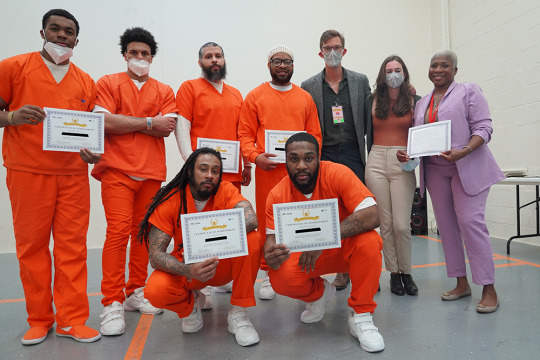
Several years ago, a team of scientists from MIT and the University of Massachusetts at Lowell designed and deployed a first-of-its-kind web programming course for incarcerated individuals across multiple correctional facilities. The program, Brave Behind Bars, uses virtual classroom technology to deliver web design training to students behind prison walls. The program brought together men and women from gender-segregated facilities to learn fundamentals in HTML, CSS, and JavaScript, helping them to create websites addressing social issues of their own choosing.
The program is accredited through three collaborating universities: Georgetown University, Benjamin Franklin Institute of Technology, and Washington County Community College. In a new open-access paper about the project, the team analyzed its impact: They used a multi-pronged approach, gathering insights through comprehensive surveys with participants from dichotomous and open-ended questions. The results painted a powerful narrative of increased self-efficacy — a crucial marker for successful reentry into the workforce and society — among incarcerated learners.
“Education has long been recognized as a pivotal factor in reducing recidivism and fostering successful reentry,” says Martin Nisser, an MIT PhD candidate in electrical engineering and computer science (EECS), affiliate of the MIT Computer Science and Artificial Intelligence Laboratory (CSAIL), and lead author of the paper. “By equipping incarcerated learners with invaluable digital literacy skills and boosting their self-efficacy, our program aims to foster the skills necessary to thrive in today’s technology-driven world.”
The strength of Brave Behind Bars is manifested vividly through the impactful websites created by the students. One project, “End Homelessness Statewide,” provided vital resources to help unhoused individuals find temporary and permanent shelter. Another website, “The PinkPrint,” addressed the unique challenges incarcerated women face, serving as a “blueprint” with educational resources and gender-responsive support. Equally remarkable was “No Excuse for Domestic Abuse,” which raised awareness about the prevalence of domestic violence while offering a lifeline to victims seeking help.
A mixed-methods research study evaluated how the 12-week, college-accredited course was faring. “Our qualitative study in 2022 involving thematic analyses of post-course surveys from 34 students revealed overwhelmingly positive feedback, with students reporting increased self-confidence, motivation, and a sense of empowerment from learning web programming skills. The themes we uncovered highlighted the powerful effect of the program on students’ self-beliefs,” says Nisser.
The urgency of such work cannot be understated, as underscored by the alarmingly high rates of recidivism, the rate at which formerly incarcerated individuals are rearrested leading to re-conviction. A central cause of mass incarceration, data shows that an estimated 68 percent of people released from U.S. jails or prisons were arrested within three years between 2005 and 2014, rising to 83 percent within nine years. However, a meta-analysis spanning 37 years of research (1980-2017) revealed a promising trend: Incarcerated individuals who participate in post-secondary educational programs are 28 percent less likely to return to prison.
Joblessness among the formerly incarcerated can be as high as 60 percent a year after release. Almost two-thirds of those who secure employment enter jobs typically available to people with little or no education, such as waste management, manufacturing, and construction — jobs increasingly being automated or outsourced.
While both the demand and supply of AI curricula in higher education have sky-rocketed, these have not typically served disadvantaged people, who must be caught up in foundational digital literacy. The ability to skillfully navigate computers and the internet is becoming essential for post-release employment in the modern workplace, as well as to navigate the economic, social, and health-related resources that are now embedded in our digital technologies.
The other part was a quantitative study in 2023, with 37 participants measuring general computer programming self-efficacy using validated scales before and after the course. The authors saw an increase in mean scores for general self-efficacy and digital literacy after the course, but the pre- and post-course measures of self-efficacy were not statistically significantly different. This challenge, the team says, is common in carceral environments, where meta-analyses of multiple studies with less significant results are often needed to achieve statistical significance and draw meaningful conclusions. The authors also acknowledge that their quantitative study contributes to this data pool, and they are conducting new courses to gather more data for future comprehensive statistical analyses.
“By providing incarcerated individuals with an opportunity to develop digital literacy, the Brave Behind Bars program facilitates self-efficacy through a novel education model designed not only to expand access to the internet for individuals but also to teach them the navigation and web design skills needed to connect and engage with the communities to which they will return,” says UMass Lowell professor and chair of the School of Criminology and Justice Studies April Pattavina, who was not involved in the research. “I applaud the team’s dedication in implementing the program and look forward to longer-term evaluations on graduates when they leave prison so we can learn about the extent to which the program transforms lives on the outside.”
One student, reflecting on the impact of the Brave Behind Bars program, says, “This class has shown me that I am human again, and I deserve to have a better quality of life post-incarceration.” In an environment where individuals can too often be made to feel like numbers, a program is underway to demonstrate that these individuals can be seen once more as people.
The research was conducted by a team of experts from MIT and UMass Lowell. Leading the team was Martin Nisser, who wrote the paper alongside Marisa Gaetz, a PhD student in the MIT Department of Mathematics; Andrew Fishberg, a PhD student in the MIT Department of Aeronautics and Astronautics; and Raechel Soicher, assistant director of research and evaluation at the MIT Teaching and Learning Laboratory. Faraz Faruqi, an MIT PhD student in EECS and CSAIL affiliate, contributed significantly to the project. Completing the team, Joshua Long brought his expertise from UMass Lowell, adding a unique perspective to the collaborative effort.
0 notes
Text
Study demonstrates efficacy of MIT-led Brave Behind Bars program
New Post has been published on https://thedigitalinsider.com/study-demonstrates-efficacy-of-mit-led-brave-behind-bars-program/
Study demonstrates efficacy of MIT-led Brave Behind Bars program
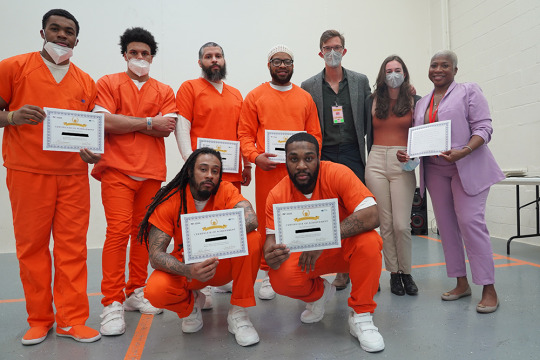

Several years ago, a team of scientists from MIT and UMass Lowell designed and deployed a first-of-its-kind web programming course for incarcerated individuals across multiple correctional facilities. The program, Brave Behind Bars, uses virtual classroom technology to deliver web design training to students behind prison walls. The program brought together men and women from gender-segregated facilities to learn fundamentals in HTML, CSS, and JavaScript, helping them to create websites addressing social issues of their own choosing.
The program is accredited through three collaborating universities: Georgetown University, Benjamin Franklin Institute of Technology, and Washington County Community College. In a new open-access paper about the project, the team analyzed its impact: They used a multi-pronged approach, gathering insights through comprehensive surveys with participants from dichotomous and open-ended questions. The results painted a powerful narrative of increased self-efficacy — a crucial marker for successful reentry into the workforce and society — among incarcerated learners.
“Education has long been recognized as a pivotal factor in reducing recidivism and fostering successful reentry,” says Martin Nisser, an MIT PhD candidate in electrical engineering and computer science (EECS), affiliate of the MIT Computer Science and Artificial Intelligence Laboratory (CSAIL), and lead author of the paper. “By equipping incarcerated learners with invaluable digital literacy skills and boosting their self-efficacy, our program aims to foster the skills necessary to thrive in today’s technology-driven world.”
The strength of Brave Behind Bars is manifested vividly through the impactful websites created by the students. One project, “End Homelessness Statewide,” provided vital resources to help unhoused individuals find temporary and permanent shelter. Another website, “The PinkPrint,” addressed the unique challenges incarcerated women face, serving as a “blueprint” with educational resources and gender-responsive support. Equally remarkable was “No Excuse for Domestic Abuse,” which raised awareness about the prevalence of domestic violence while offering a lifeline to victims seeking help.
A mixed-methods research study evaluated how the 12-week, college-accredited course was faring. “Our qualitative study in 2022 involving thematic analyses of post-course surveys from 34 students revealed overwhelmingly positive feedback, with students reporting increased self-confidence, motivation, and a sense of empowerment from learning web programming skills. The themes we uncovered highlighted the powerful effect of the program on students’ self-beliefs,” says Nisser.
The urgency of such work cannot be understated, as underscored by the alarmingly high rates of recidivism, the rate at which formerly incarcerated individuals are rearrested leading to re-conviction. A central cause of mass incarceration, data shows that an estimated 68 percent of people released from U.S. jails or prisons were arrested within three years between 2005 and 2014, rising to 83 percent within nine years. However, a meta-analysis spanning 37 years of research (1980-2017) revealed a promising trend: Incarcerated individuals who participate in post-secondary educational programs are 28 percent less likely to return to prison.
Joblessness among the formerly incarcerated can be as high as 60 percent a year after release. Almost two-thirds of those who secure employment enter jobs typically available to people with little or no education, such as waste management, manufacturing, and construction — jobs increasingly being automated or outsourced.
While both the demand and supply of AI curricula in higher education have sky-rocketed, these have not typically served disadvantaged people, who must be caught up in foundational digital literacy. The ability to skillfully navigate computers and the internet is becoming essential for post-release employment in the modern workplace, as well as to navigate the economic, social, and health-related resources that are now embedded in our digital technologies.
The other part was a quantitative study in 2023, with 37 participants measuring general computer programming self-efficacy using validated scales before and after the course. The authors saw an increase in mean scores for general self-efficacy and digital literacy after the course, but the pre- and post-course measures of self-efficacy were not statistically significantly different. This challenge, the team says, is common in carceral environments, where meta-analyses of multiple studies with less significant results are often needed to achieve statistical significance and draw meaningful conclusions. The authors also acknowledge that their quantitative study contributes to this data pool, and they are conducting new courses to gather more data for future comprehensive statistical analyses.
“By providing incarcerated individuals with an opportunity to develop digital literacy, the Brave Behind Bars program facilitates self-efficacy through a novel education model designed not only to expand access to the internet for individuals but also to teach them the navigation and web design skills needed to connect and engage with the communities to which they will return,” says UMass Lowell professor and chair of the School of Criminology and Justice Studies April Pattavina, who was not involved in the research. “I applaud the team’s dedication in implementing the program and look forward to longer-term evaluations on graduates when they leave prison so we can learn about the extent to which the program transforms lives on the outside.”
One student, reflecting on the impact of the Brave Behind Bars program, says, “This class has shown me that I am human again, and I deserve to have a better quality of life post-incarceration.” In an environment where individuals can too often be made to feel like numbers, a program is underway to demonstrate that these individuals can be seen once more as people.
The research was conducted by a team of experts from MIT and UMass Lowell. Leading the team was Martin Nisser, who wrote the paper alongside Marisa Gaetz, a PhD student in the MIT Department of Mathematics; Andrew Fishberg, a PhD student in the MIT Department of Aeronautics and Astronautics; and Raechel Soicher, assistant director of research and evaluation at the MIT Teaching and Learning Laboratory. Faraz Faruqi, an MIT PhD student in EECS and CSAIL affiliate, contributed significantly to the project. Completing the team, Joshua Long brought his expertise from UMass Lowell, adding a unique perspective to the collaborative effort.
#2022#2023#Aeronautical and astronautical engineering#aeronautics#ai#analyses#Analysis#approach#artificial#Artificial Intelligence#awareness#Benjamin Franklin#Careers#challenge#Classes and programs#collaborative#college#Community#comprehensive#computer#Computer Science#Computer Science and Artificial Intelligence Laboratory (CSAIL)#Computer science and technology#computers#construction#course#courses#CSS#data#Design
0 notes